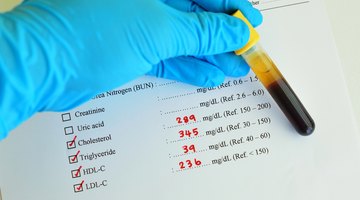Biotin & Breast-feeding
With a newborn in the house, you need all the energy you can get, and biotin will help you. Biotin, or vitamin H, is used to digest carbohydrates, fats and proteins, converting food into energy. It’s also needed for healthy skin, hair and eyes as well as proper liver and nervous system functioning. It’s rare to be deficient in biotin, but pregnancy makes you more susceptible. You need more of this nutrient when breast-feeding to keep you and your baby healthy.
Signs of a Deficiency
Biotin is a water-soluble vitamin. You don’t store it, but rather excrete it through your urine. Without adequate amounts of this vitamin, you develop signs of a deficiency. According to MedlinePlus, there is no accurate test to detect a deficiency, but your doctor should recognize it by your symptoms, which include thinning hair and a scaly rash on your face. Biotin is also required for a healthy nervous system, and without enough you may develop depression, exhaustion, hallucinations and tingling in your arms and legs.
Recommendations and Sources

Side Effects of Vitamins B12 & B6
Learn More
Adults and pregnant women need 30 micrograms of biotin daily. The recommended dietary allowance for breast-feeding women is 35 micrograms. Biotin is found in brewer’s yeast, egg yolks, nuts, beans, black-eyed peas, whole grains, cauliflower, bananas and mushrooms. Food processing can kill biotin, so opt for the least processed version of these foods. Try to eat enough healthy foods to meet your biotin requirements, but if you’re concerned you may be deficient, speak to your physician about taking a supplement.
Biotin in Your Breast Milk
When breast-feeding, you not only excrete biotin in your urine, but you pass it to your baby through your breast milk, which is why the recommended dosage is higher for breast-feeding moms. According to the Institute of Medicine's “Nutrition During Lactation,” your breast milk contains variable amounts of biotin. The more you nurse your baby, the more biotin is in your milk. The quantity of biotin is also directly linked to the biotin in your blood, but the quantity in your milk is hundreds of times greater than the content in your blood.
Cradle Cap and Biotin

Calcium, Magnesium, & Zinc Supplement Safety During Pregnancy
Learn More
Biotin may be useful in treating cradle cap in infants. Although harmless, cradle cap causes flaky, dry skin on your baby’s scalp. You might also notice thick yellow or brown scaly patches that flake on her head or around her ears, eyebrows, eyelids and armpits. This condition should clear up on its own by 12 months of age, but you can take a biotin supplement to move the process along. NYU Langone Medical Center recommends breast-feeding moms take a biotin supplement to treat cradle cap or care for their baby's brittle finger and toenails. Check with your doctor first before adding supplements to your diet.











